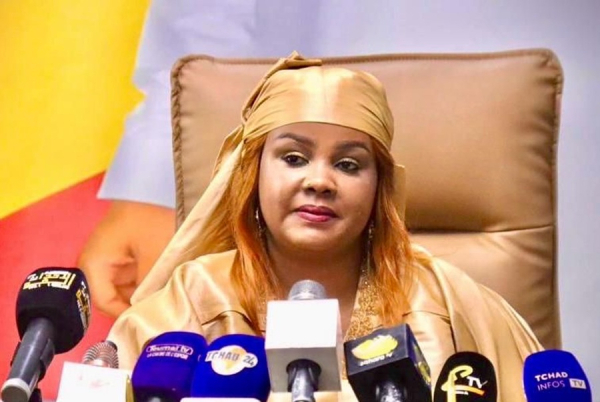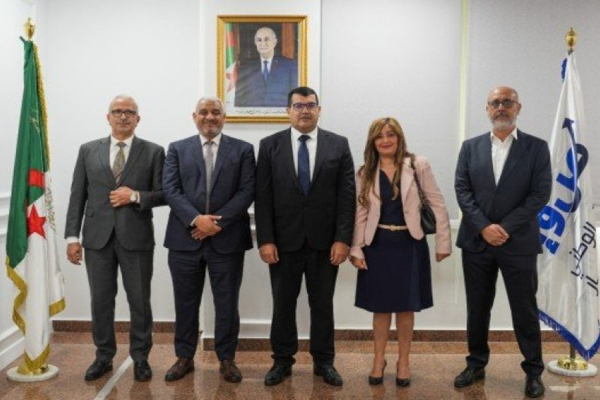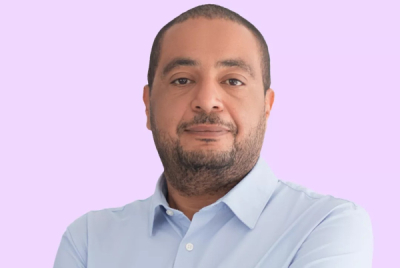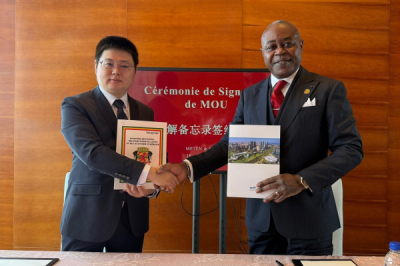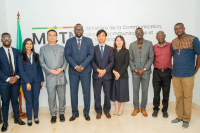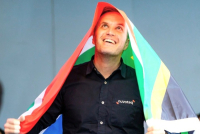• Chad to launch digital mining cadastre on September 19
• System to centralize titles, secure zones, boost transparency
• Part of reforms aiming to raise mining GDP share to 5% by 2030
Chad's Secretary of State for Petroleum, Mines, and Geology, Khadidja Hassane Abdoulaye, announced on Wednesday, September 17, the imminent launch of a digital system for managing mining activities across the country. Scheduled for Friday, September 19, the tool will centralize the issuance of mining titles, secure exploration and exploitation zones, and provide investors and citizens with real-time access to information.
"The launch and operationalization of this tool constitute a significant step in our commitment to modernize and secure the management of national mineral resources. It is a strong pledge toward transparency, good governance, and the sustainable development of our wealth," Abdoulaye said.
The implementation of the digital mining cadastre is part of a broader reform effort to streamline the extractive sector. In recent years, Chad has adopted legal and technical adjustments to align its regulatory framework with international standards and make its mining sector more attractive. Currently, the sector accounts for only about 1% of the country's GDP, but the government aims to increase this to 5% by 2030.
Across the continent, several African countries, including the DRC, Gabon, and Burkina Faso, have already introduced digital mining cadastres to curb fraud, secure investments, and increase tax revenues. Chad is following this trend to enhance transparency and competitiveness in the management of its natural resources.
Beyond attracting investment, the project is also seen as a tool for good governance. For investors, it guarantees better access to data and reduces risks related to land disputes. For citizens, it embodies a promise of greater transparency and more equitable management of national wealth, as the country seeks to diversify its economy and reduce its dependence on hydrocarbons.
Samira Njoya
• Algeria’s FNI partners with four firms to build tech hub
• Project targets digital finance, public sector transformation
• Part of 2030 strategy to modernize services, boost innovation
Algeria's National Investment Fund (FNI) announced on Tuesday, September 16, that it has signed an agreement with a consortium of four digital companies: Optimum Télécom Algérie (Djezzy), IT-DEV Spa, Inet Spa, and Smart Test Spa. The initiative aims to lay the groundwork for the creation of a national technology hub.
According to the FNI, the hub is intended to "become a major player in digitization, primarily in the financial sector, by bringing together the expertise, infrastructure, and technological subsidiaries and stakes held by the FNI."
The fund's statement said the hub will integrate digital solutions into the financial sector and support public institutions and businesses in their digital transformation. This will help enhance the range of modern, accessible, and high-performance services available to citizens and companies. The FNI emphasized that the project represents a strategic turning point for its role in the national digital ecosystem, ensuring resource consistency, optimization, and sharing.
This initiative is part of the country's developing National Digital Transformation Strategy 2030, which prioritizes digital governance. It comes as Algeria ramps up digital projects to modernize its administration and stimulate innovation. In recent years, the country has strengthened its telecommunications infrastructure, expanded 4G coverage to more than 85% of the population, and launched several digital skills training programs for young people and businesses. The technology hub is expected to build on these achievements to create a structured ecosystem capable of sharing resources and leveraging local expertise.
Once operational, the hub is expected to optimize technological investments, accelerate innovation in digital services, and attract regional and international players. The initiative could also play a key role in economic development by fostering the emergence of solutions tailored to the needs of the financial sector while strengthening the competitiveness of Algerian startups and businesses in the digital market.
Samira Njoya
He develops digital solutions that are transforming access to financial and real estate services for international communities. His approach focuses on connectivity and the efficiency of cross-border systems.
Khalid Ashmawy (photo) is an Egyptian entrepreneur and computer scientist who founded Munify, an innovative cross-border neobank primarily serving the Egyptian diaspora.
Founded in January 2025, Munify offers a comprehensive digital banking solution accessible from the United States and the Middle East. The platform's proprietary infrastructure directly connects international banking systems, allowing users to send real-time, low-cost funds.
Customers can open a U.S. dollar account in minutes, get a virtual debit card, and protect their savings from the volatility of the Egyptian pound—a valuable feature given the country's unstable economic climate.
Munify's mission is to "simplify and improve financial services for businesses by providing secure, innovative, and scalable solutions that drive growth and efficiency." In September 2025, the neobank raised $3 million with support from Y Combinator, BYLD, and Digital Currency Group.
Ashmawy is also a co-founder of Huspy, a company he started in 2019. Huspy has developed a "super app" for the real estate market, which allows users to buy, sell, finance, or rent homes in Europe and the Middle East.
He earned a bachelor's degree in computer science from the German University in Cairo in 2010 and a master's degree in computer science from the University of Stuttgart in Germany in 2011. He began his career in 2012 as a software engineer at Microsoft in the U.S. before working as a technical lead at Uber from 2016 to 2019.
Melchior Koba
He works to transform how companies organize their communications and activities. He offers new technologies that are revolutionizing corporate collaboration habits.
Nassreddine Riahi is a Tunisian entrepreneur, founder, and CEO of Cynoia, a startup that develops solutions to optimize communication and workflow management for businesses.
Founded in 2019 by Riahi and Ayoub Rabeh, Cynoia has created a centralized platform that unifies all of a company's communication and collaboration tools. The goal is to reduce scattered exchanges and facilitate the organization, tracking, and management of projects while helping to control costs.
The solution integrates multiple functions into a single environment, including project management with budget tracking, instant messaging with voice options, video conferencing, and activity planning. Today, the platform has more than 4,000 users across nine countries. Cynoia was named the best SaaS startup at the AfricArena Grand Summit 2024 in Cape Town, South Africa.
In addition to his role at Cynoia, Nassreddine Riahi serves as the executive vice president of international relations for Entrepreneurs without Borders. He also sits on the board of directors for TunisianStartups, where he was elected a board member on September 29, 2023.
Before starting Cynoia, he co-founded Smart Shore Center, a customer relations company, in 2010, where he served as sales director until 2019. From 2016 to 2019, he was the director of LR Consulting, an IT consulting firm he founded.
Riahi holds a university degree in mechanical and production engineering, which he obtained in 2005 from IUT Sénart-Fontainebleau.
Melchior Koba
• Congo signs digital economy pact with China’s Genew Technologies
• Deal targets AI training, infrastructure, digital public services
• Part of $100M World Bank-backed Digital Transformation project
The Congolese government announced on Thursday, September 18, that it has signed a memorandum of understanding with Chinese technology company Genew Technologies. The partnership aims to develop the digital economy, strengthen critical infrastructure, and train young people in artificial intelligence (AI).
The agreement was signed by Léon Juste Ibombo (photo, right), the Minister of Posts, Telecommunications, and Digital Economy, on the sidelines of the BRICS summit on the new industrial revolution being held in China. According to Ibombo, this is a new partner and investor in the government's vision to make the digital sector the fifth pillar of its National Development Plan 2022-2026. The government seeks to leverage information and communication technologies (ICT) for the country's socio-economic development.
The government's statement did not specify which digital projects the collaboration would cover. However, the country's flagship initiative in this area is the Digital Transformation Acceleration Project (DTAP), which is supported by a $100 million World Bank loan and a 27 billion CFA francs (about $48.7 million) loan from the European Investment Bank.
According to the World Bank, this program focuses on the productive use of broadband to deliver digital public services. It aims to finance connectivity in isolated areas, establish a secure government intranet, develop a single portal for online citizen services, and implement multiple information systems to improve the management of public services.
In a June 2022 press release, the Bretton Woods institution stated that the project was expected to increase 3G mobile broadband availability for an additional 404,000 people. It would also provide 3,000 people with the opportunity to acquire certified digital skills and enable 75,000 people per day to access project-supported digital services.
Isaac K. Kassouwi
-
Djibouti startup Sahaal Ride launched in 2024 to connect passengers and drivers.
-
The app offers ride booking, tracking, and payments via cash or mobile money.
-
It aims to bring transparency and structure to Djibouti’s taxi market.
Sahaal Ride, a digital solution developed by a Djiboutian startup, connects riders and drivers through a mobile application. Users can book a ride in a few clicks, geolocate their driver, and track the trip in real time. The platform also offers flexible payment options, including cash and mobile money, tailored to local habits. The startup was launched in 2024 by Abdi Djama Waberi.
The app is available on iOS and Android, where it has already recorded more than 1,000 downloads, according to the Play Store. For drivers, Sahaal provides a platform that simplifies trip management, improves revenue visibility, and secures transactions. It also helps reduce waiting times and optimize travel in a capital facing rapid demographic growth and rising mobility needs.
Beyond connecting riders and drivers, Sahaal aims to gradually structure Djibouti’s taxi market. By increasing transparency in pricing and improving service quality, the app seeks to build trust between users and drivers.
The startup reflects a broader wave of local innovation that promotes entrepreneurship and Djiboutian tech skills. It also encourages women’s participation, expanding professional opportunities in a sector still dominated by men.
In a country where digital transformation is accelerating, Sahaal shows how a local startup can meet community needs. The company plans to grow its user base and establish itself as a key player in urban mobility in Djibouti and the wider region.
• Senegal to launch national data interoperability platform in December
• First phase targets social aid, transparency, and admin efficiency
• Part of digital reforms under Senegal 2050 Agenda, New Tech Deal
Senegal plans to launch the first phase of its national data interoperability platform in December. The project, initiated by the government in April, aims to streamline and secure the exchange of information among ministries, public agencies, and private entities.
According to the Coordination Committee, which met on Tuesday to assess the project's progress, the platform will initially be used to accelerate the payment of social assistance to vulnerable families, enhance transparency in public management, and simplify administrative procedures for citizens and businesses.
"Interoperability is not just a technical innovation; it's a lever to modernize governance and stimulate innovation in the digital ecosystem," the Ministry of Communications, Telecommunications, and Digital Economy stated.
The project is a key component of the country’s New Technology Deal and the Senegal 2050 Agenda, which aims to modernize the administration, optimize public resources, and position the country as a regional digital hub. In recent years, Dakar has pursued several reforms to digitize public services, including the Senegal Services platform and the gradual dematerialization of administrative procedures.
With an internet penetration rate estimated at 70% as of January 2025 and widespread adoption of mobile money, the new platform could transform the user experience and build greater trust in digital administration. It is also expected to create new opportunities for local startups by providing secure and standardized access to public data.
Samira Njoya
• Mauritius, Morocco, South Africa lead Africa in 2025 innovation
• WIPO ranks innovation using 80 indicators across 139 countries
• Morocco hits record high; Senegal, Namibia show strong progress
Mauritius, Morocco, and South Africa are the most innovative African countries in 2025, according to the Global Innovation Index 2025, a report released on Tuesday by the World Intellectual Property Organization (WIPO).
The study, titled "Global Innovation Index 2025: Innovation at a Crossroads," analyzes the innovation performance of 139 countries based on 80 indicators across seven pillars, including institutions, human capital, research, infrastructure, and market and business sophistication.
Top Ten African Economies
Mauritius ranked 53rd globally, confirming its role as a regional leader. According to the report, the island nation’s strong institutions, high-performing education system, and pro-investment policies have boosted its innovation capabilities.
Morocco climbed to 57th place, its highest-ever ranking, a result of sustained policies in renewable energy, industrialization, and digitalization. South Africa, ranked 61st, maintained its position as a regional powerhouse due to its network of top universities and a vibrant research and development ecosystem.
Behind the top three, the Seychelles ranked 75th, making progress through the digitalization of public services and a focus on sustainable development. Tunisia, at 76th, held its spot among the continent's most innovative economies, thanks to its quality human capital and dynamic tech sector.
Egypt ranked 86th, solidifying its status as a digital hub in North Africa with a rapidly expanding entrepreneurial ecosystem. Botswana, at 87th, continued to advance, leveraging its stable governance and growing financial and service sectors.
Senegal, ranked 89th, was highlighted as an "outperformer" relative to its level of development, driven by its vibrant startup ecosystem and the rise of venture capital. Namibia also saw significant progress, reaching 91st place, supported by investments in education and institutional reforms. Lastly, Cape Verde, at 95th, was buoyed by a surge in mobile services and government initiatives supporting tech entrepreneurship, despite a slight drop in its global ranking from the previous year.
While no African country cracked the global top 50, the report points to several positive trends. The upward mobility of economies like Morocco, Senegal, and Namibia highlights the growing diversity of innovation drivers across the continent.
Internationally, Switzerland, Sweden, and the United States topped the rankings, reaffirming their status as the world's most innovative economies.
Samira Njoya
Based on the "Global Innovation Index 2025" report, here is the ranking of the most innovative African countries:
|
African Rank |
Country |
Global Rank |
|
1 |
Mauritius |
53 |
|
2 |
Morocco |
57 |
|
3 |
South Africa |
61 |
|
4 |
Seychelles |
75 |
|
5 |
Tunisia |
76 |
|
6 |
Egypt |
86 |
|
7 |
Botswana |
87 |
|
8 |
Senegal |
89 |
|
9 |
Namibia |
91 |
|
10 |
Cape Verde |
95 |
|
11 |
Ghana |
101 |
|
12 |
Kenya |
102 |
|
13 |
Rwanda |
104 |
|
14 |
Nigeria |
105 |
|
15 |
Côte d'Ivoire |
110 |
|
16 |
Zambia |
112 |
|
17 |
Algeria |
115 |
|
18 |
Cameroon |
116 |
|
19 |
Togo |
117 |
|
20 |
Benin |
118 |
|
21 |
Madagascar |
120 |
|
22 |
Tanzania |
121 |
|
23 |
Uganda |
124 |
|
24 |
Malawi |
125 |
|
25 |
Burkina Faso |
126 |
|
26 |
Burundi |
127 |
|
27 |
Mozambique |
128 |
|
28 |
Zimbabwe |
129 |
|
29 |
Mauritania |
131 |
|
30 |
Lesotho |
132 |
|
31 |
Guinea |
133 |
|
32 |
Ethiopia |
134 |
|
33 |
Mali |
135 |
|
34 |
Republic of the Congo |
137 |
|
35 |
Angola |
138 |
|
36 |
Niger |
139 |
Adriaan Kruger, a South African technology entrepreneur, is making his mark in digital health by designing platforms for clinical research. He is the cofounder and chief executive of nuvoteQ.io, a software development firm. In September, he was selected among the ten finalists of Africa’s Business Heroes, whose semifinal took place in Dakar, Senegal.
Founded in 2014, nuvoteQ.io builds digital solutions to manage clinical trials and life sciences data. The company aims to replace paper-based data collection with digital tools.
Among its key products is Kronus, a web-based clinical trial management platform. It enables data entry, workflow automation, and real-time access to information while ensuring regulatory compliance. The firm also developed Nukleus, an eSource platform that removes manual data entry, and SafetyBase, a pharmacovigilance tool that centralizes and structures safety data.
Kruger co-founded Scigenix in 2023, a health data company where he serves on the board. In 2024, he helped establish the nuvoteQ Foundation, which supports and protects health technologies critical to public health.
He also leads the tech team at Clinical Trial Community, a platform that helps identify clinical trial sites in Africa. In addition, he serves as vice president of SACRA South Africa, an association dedicated to clinical research.
Kruger graduated with a bachelor’s degree in information technology from the University of Pretoria in 2005 and earned a bachelor’s degree in business management in 2010 from the Unisa Graduate School of Business Leadership.
He began his career in 2005 at iOCO, an Oracle technology solutions provider, where he worked as a consultant and later as an account and sales manager, before leading the Oracle technologies and hardware division. In 2014, he joined Cytespace Research Private as a senior associate, focusing on patient-centered data solutions for clinics and hospitals.
This article was initially published in French by Melchior Koba
Adapted in English by Ange Jason Quenum
South African entrepreneur Serisha Barrat is reshaping Africa’s legal landscape through technology. As cofounder and chief executive of Lawyered Up, she combines law, business, and artificial intelligence to help companies streamline legal operations.
Founded in 2020, Lawyered Up focuses on digitalizing legal services across the continent. The platform uses AI to automate and simplify legal management for small and medium-sized firms as well as large corporations.
Lawyered Up offers an end-to-end solution for contract lifecycle management. It integrates digital workflows to accelerate processes, reduce costs, and ensure regulatory compliance. The system also supports businesses in meeting African business law requirements and advancing environmental, social and governance (ESG) goals.
Beyond Lawyered Up, Barrat co-founded OPUS in 2023, a collective of entrepreneurs and creators designed to foster idea-sharing and collaboration. She previously launched eCrow Media in 2018, a social media marketing agency where she served as digital marketing director until 2020.
Barrat graduated with a law degree from the University of Witwatersrand in 2015. She began her career at Nedbank in 2013 as promotions assistant, then joined Standard Bank Group in 2015, serving as legal advisor, compliance manager, and corporate lawyer.
In 2018, she moved to Old Mutual Wealth as a legal and compliance analyst. Between 2020 and 2022, she led marketing at Here Marketing and simultaneously worked as marketing director at StartX, a start-up accelerator. From 2023 to April 2025, she was CEO of Boardroom App, a professional networking application.
In 2023, Women in Tech and EQL Her named Barrat among the 50 most influential women in technology. In 2024, the Mail & Guardian ranked her in its annual list of the 200 most promising young South Africans.
This article was initially published in French by Melchior Koba
Adapted in English by Ange Jason Quenum
More...
- Cabrel Dji, telecom engineer and entrepreneur, leads fintech startup FreemoPay.
- Launched in 2021, the app enables digital savings, payments, and small loans.
- Platform modernizes tontines with remote contributions, alerts, and reports.
Cameroonian tech entrepreneur Cabrel Dji is co-founder and CEO of FreemoPay, a fintech startup created in 2021.
FreemoPay offers a solution tailored to small merchants, easing payments without relying on physical cash. The app provides savings, payment, and loan services, with a mission to modernize and secure the management of tontines through innovative technology.
The platform allows members to make contributions remotely at any time. Small businesses can register and manage tontine groups, receive instant notifications of deposits, and access automated, detailed reports.
Before launching FreemoPay, Dji founded IMOBBIS in 2019, a housing search app that he led until 2022. He also co-founded ThêtaTECHS in 2021, an IT and technology services provider, serving as CEO until 2022.
Dji studied at the University of Yaoundé I, where he earned a degree in electronics, electrotechnics, and automation. He later attended Cameroon’s National Advanced School of Posts and Telecommunications, graduating in telecommunications (2021) and network and systems security (2023).
• CAF to unveil “Yalla” app on September 25 for tickets, Fan ID, lodging, and visas.
• App to centralize services, with real-time updates and security information.
• Move aligns with Morocco’s tech upgrades ahead of AFCON 2025 and World Cup 2030.
The Confederation of AfriAfCON Football (CAF) will launch the “Yalla” mobile app on September 25 ahead of the Africa Cup of Nations (AFCON), which will take place from December 21, 2025, to January 18, 2026, in Morocco. The tool is designed to enhance the fan experience and centralize access to key services for the tournament.
According to CAF, the app will integrate ticketing, accommodation, and match schedules. Each ticket holder will need to register to obtain a Fan ID through the platform, ensuring smooth entry into stadiums and fan zones. The app will also allow visitors to complete and track their e-Visa applications online. In addition, it will provide real-time updates, personalized content, security information, and local guidance to support foreign spectators.
The launch of Yalla is part of a broader strategy to use new technologies for the successful organization of the AFCON. Earlier this year, Morocco unveiled its “Décollage 2025” plan to modernize airports and improve the traveler experience through the SMART AIRPORT system, which monitors infrastructure in real time, optimizes passenger flows, and collects data. The planned rollout of 5G in November will make AFCON 2025 the first large-scale test of this technology in Morocco.
These initiatives aim not only to ensure the smooth running of the tournament but also to prepare for the 2030 FIFA World Cup, which Morocco will co-host with Spain and Portugal. They are also expected to improve travel experiences and strengthen nationwide data management and coordination.
The congestion highlights the limitations of satellite broadband when demand surges in densely populated urban areas. It’s a reminder that no single technology—no matter how advanced—can meet the continent’s connectivity needs alone.
Starlink has paused new residential internet kit sales in parts of Lagos and Abuja, citing congestion on its network as demand outpaces capacity in Nigeria’s busiest urban centers. New customers in these zones can only join via a waitlist with a deposit until more capacity is unlocked.
On September 16, users in Abuja attempting to order a Starlink kit encountered the following notice: “Starlink service is currently at capacity in your area. However, the good news is you can still place a deposit now to reserve your spot on the waitlist and receive a notification as soon as service becomes available again. Please note that we cannot provide an estimated timeframe for service availability, but our teams are working as quickly as possible to add more capacity to the constellation so we can continue to expand coverage for more customers around the world.”
This pause mirrors a previous suspension in late 2024, when Starlink froze nationwide orders for nearly eight months due to limited bandwidth and pending regulatory approval from the Nigerian Communications Commission (NCC). Sales only resumed in June 2025 after infrastructure upgrades and clearance. A similar scenario played out in Kenya in November 2024, when Starlink halted new subscriptions in Nairobi and five surrounding counties after overwhelming demand stretched the network’s capacity.
The oversubscription underscores Nigeria’s urgent demand for reliable, high-quality internet services, even at rising price points. For consumers, the stakes are immediate: affordability and access. Residential service now costs ₦57,000 ($38) monthly, up from ₦38,000 ($25) initially. Yet demand remains strong, reflecting a growing appetite for connectivity that meets international standards. Starlink counted 59,509 active users in Q1 2025, according to the National Communications Commission (NCC) data—about 20.6% of Nigeria’s 289,369 ISP subscribers.
For policymakers, the lesson is broader: Africa’s digital future cannot rely on a single technology. With the continent’s digital economy projected by the World Bank to reach $180 billion by 2025, affordable and reliable connectivity is essential. That requires a resilient ecosystem combining satellites for remote communities, mobile broadband expansion, and fiber backbones in urban centers. Without investment in complementary infrastructure and strong policy frameworks, Africa risks bottlenecks that could slow digital trade, financial inclusion, and e-governance ambitions.
The developments in Nigeria, Starlink’s largest African market, are now a test case for how satellite internet operators will adapt to the continent’s fast-growing but price-sensitive demand.
Hikmatu Bilali
In a world of accelerating globalization and remote work, this startup is positioned to make outsourcing more seamless, secure, and efficient—a promising development for African freelancers.
Rafiki, a digital solution specializing in cross-border payments and freelance talent collaboration, is offering a software platform to simplify outsourcing, invoicing, and compliance for freelancers, agencies, and companies, especially in Africa. The startup was founded in 2023 by Greg Cooke and Nicolas Boswell.
"Unlike other embedded finance or invoicing platforms, we’ve focused on multi-party, collaborative invoicing and the associated flow of funds, saving significant time and cost associated with outdated workflows and invoicing we’d previously accepted," said Greg Cooke.
The solution provides a suite of software and services that enables freelancers, agencies, and small businesses to collaborate easily across borders. It includes Rafiki OS, an integrated SaaS platform with financial technology modules like Open Banking, stablecoins, and mobile money. The platform allows for the automated management of payments, invoices, and legal verifications (KYC, KYB) in over 130 countries.
Users can issue multi-party invoices, consolidate contributions from several subcontractors into a single invoice, and execute fast, low-cost cross-border payments. Additionally, Rafiki Talent Services supports freelancers and agencies with a network of vetted senior talent from Africa, the U.K., and the Netherlands. The network is built on a rigorous interview and testing process with a low admission rate to guarantee quality.
The service also offers Contractor of Record (CoR) or Employer of Record (EoR) options, which allow client companies to delegate the administrative and legal management of subcontractors. Using Rafiki, a company or project can outsource tasks to specialists, compile contributions, and then pay each subcontractor through the platform. For African freelancers, this provides an opportunity to access international markets with tools that ease administrative and financial constraints.
Adoni Conrad Quenum


